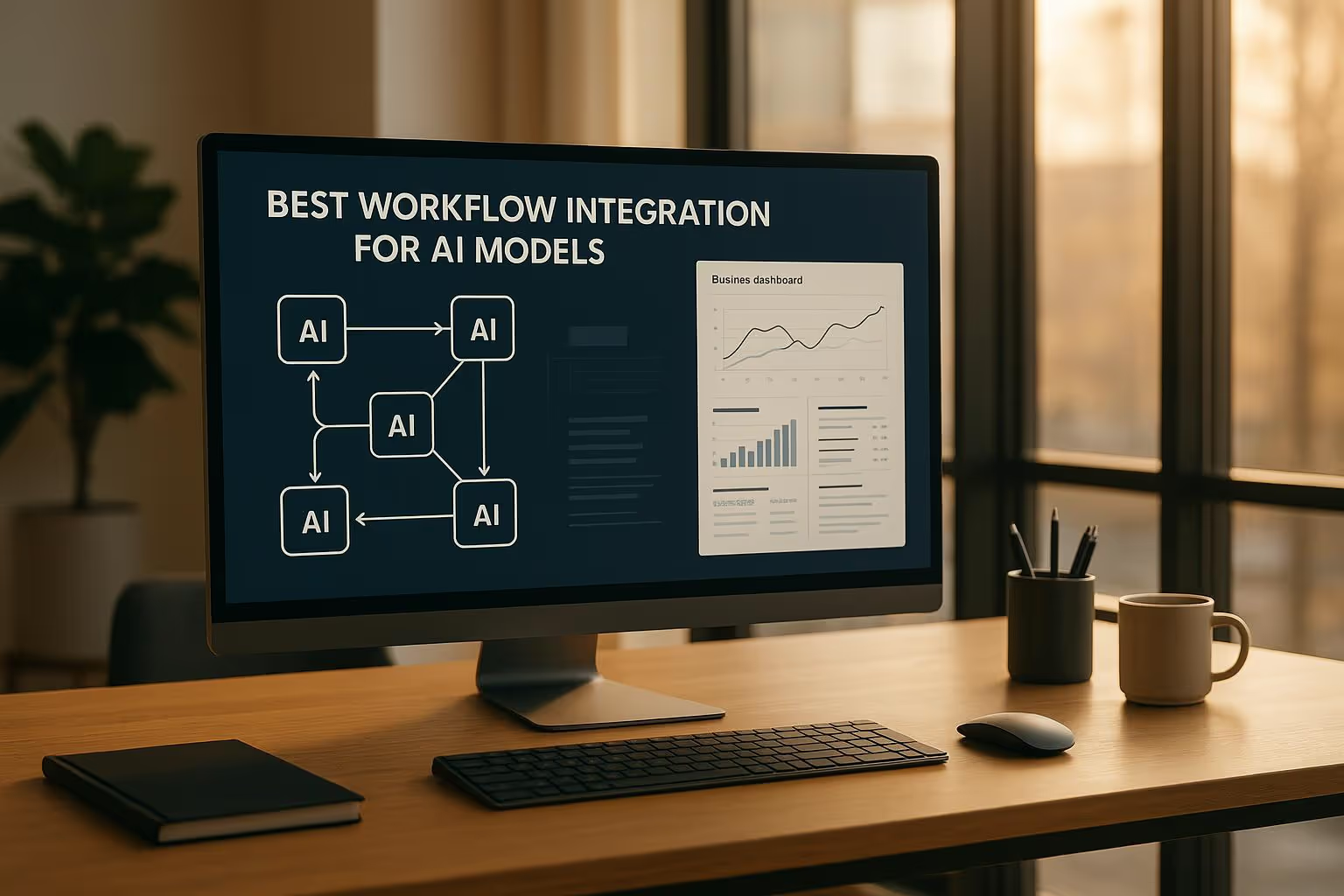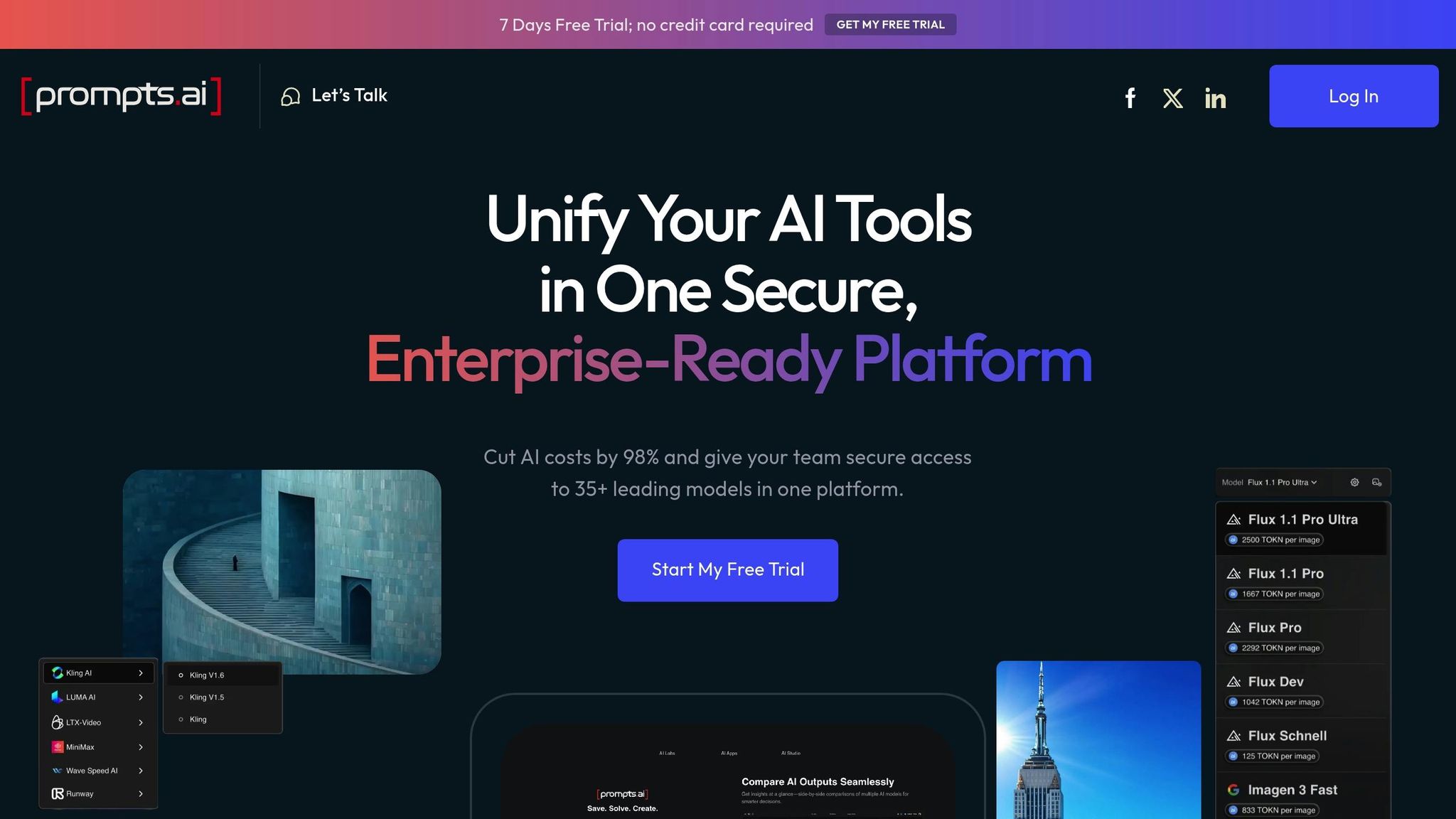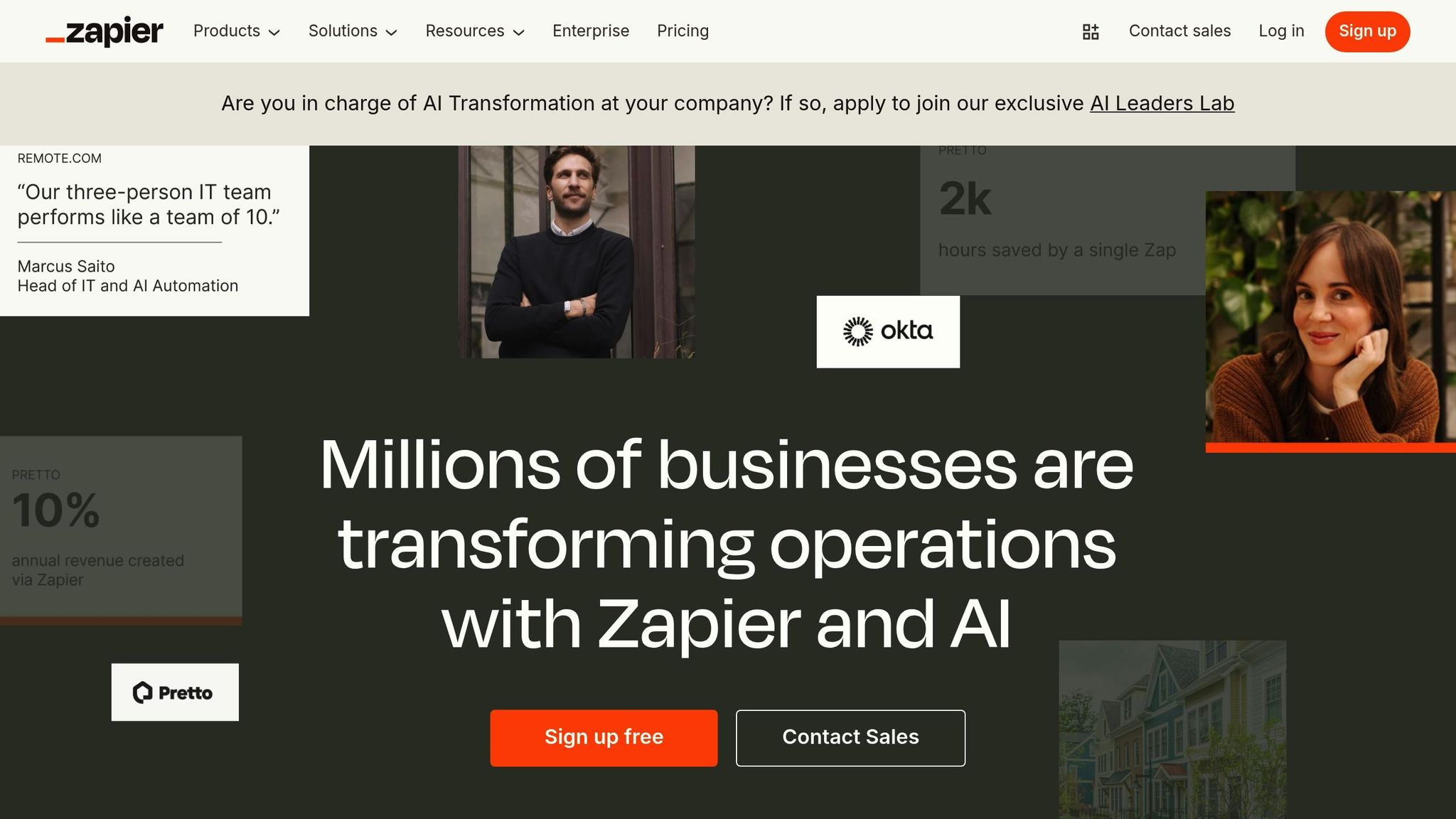
AI workflow integration is becoming essential for businesses aiming to improve efficiency and decision-making. This article reviews three leading platforms that simplify the process of embedding AI models into daily operations: Prompts.ai, Zapier AI, and Make (formerly Integromat). Each platform addresses challenges like tool sprawl, cost control, and governance in unique ways.
| Platform | Strengths | Pricing | Best For |
|---|---|---|---|
| Prompts.ai | Multi-model access, cost savings, governance | From $99/member/month | Enterprises with compliance needs |
| Zapier AI | No-code simplicity, wide app support | From $19.99/month | Small teams, non-technical users |
| Make | Customizable API workflows | Usage-based | Technical users, custom solutions |
Choose based on your team's technical skills, budget, and workflow needs.

Prompts.ai simplifies the integration of AI workflows by bringing together over 35 leading AI models into a single, secure platform. This approach tackles the common challenge faced by U.S. businesses of managing multiple AI tools. With models like GPT-4, Claude, LLaMA, and Gemini available through one interface, businesses can streamline model evaluation and optimize their workflows without juggling multiple platforms.
What sets Prompts.ai apart is its focus on seamless model interoperability. Users can compare large language models side-by-side, making it easier for teams to determine which model is best suited for specific tasks - all without the hassle of switching between platforms. Additionally, the platform’s AI-powered integrations work effortlessly with tools like Slack, Gmail, and Trello, transforming one-off AI tasks into repeatable, scalable processes that fit naturally into existing workflows.
By enabling real-time model comparisons and automating processes across departments, Prompts.ai removes bottlenecks and enhances collaboration.
A standout feature of Prompts.ai is its emphasis on cost efficiency. The platform claims to cut costs by up to 98% while replacing over 35 separate AI tools in just minutes. Using a Pay-As-You-Go TOKN credit system, it avoids the need for recurring subscription fees. Instead, costs are directly tied to usage, offering businesses the financial clarity and control that CFOs prioritize.
Governance is a major focus for Prompts.ai, especially for businesses scaling their AI operations. The platform includes Compliance Monitoring and Governance Administration tools across its business plans, ensuring full visibility and auditability of all AI interactions. IT administrators can manage security policies and compliance requirements from a single dashboard, providing a clear audit trail and simplifying the often chaotic process of AI adoption.
Prompts.ai is designed to grow alongside its users. Its flexible architecture allows businesses to add new models, users, and teams in just minutes, ensuring that AI workflows can scale effortlessly as organizations expand. The Interoperable Workflows feature, available across all business plans (Core at $99 per member/month, Pro at $119 per member/month, and Elite at $129 per member/month), ensures that companies can enhance their AI capabilities without overhauling their systems.
Teams using Prompts.ai report productivity increases of up to 10x when leveraging side-by-side model comparisons, demonstrating how efficiency gains multiply as AI operations scale across larger teams and complex workflows. Next, we’ll explore another platform with its own unique advantages.

Zapier AI takes workflow automation to the next level by integrating AI capabilities with over 6,000 apps available on its platform. Building on Zapier's years of expertise in automation, this service introduces AI-driven features that can trigger actions, analyze data, and make decisions seamlessly across connected applications. The best part? Businesses can incorporate AI into their workflows without needing technical know-how or custom development. Let’s dive into how Zapier AI improves integration efficiency.
One of Zapier AI's standout features is its ability to connect with multiple AI providers through its automation framework. This means businesses can combine different AI models and services into a single workflow. For instance, you could use one AI tool for text analysis, another for image recognition, and a third for summarizing data - all working together in a unified sequence.
The platform excels at turning AI-generated insights into actionable steps. For example, after processing data, Zapier AI can automatically send formatted results to team members via Slack, update records in Salesforce, or create tasks in project management tools like Asana. This seamless integration ensures that AI outputs are not just informative but also immediately useful.
Zapier AI uses a task-based pricing model, with costs tied to the number of automated actions performed. Plans start at $19.99 per month for 750 tasks under the Starter plan. Professional plans, offering 2,000 tasks, begin at $49 per month, while Team plans start at $69 per month, allowing up to 50,000 tasks.
This structure helps businesses predict costs based on automation volume rather than the specific AI models used. However, it's important to note that a single AI process can trigger multiple actions - like updating several systems or notifying team members - leading to higher task consumption. This requires businesses to carefully monitor their task usage to avoid unexpected costs.
Zapier AI includes robust governance tools to give teams control and visibility over their workflows. Centralized dashboards allow administrators to monitor all automations and AI integrations. Team plans come with audit logs, which track when automations are run, what data is processed, and who created or modified the workflows.
Data security is a priority, with app permissions that let administrators limit access to specific applications or data sources. Additionally, the platform provides alerts for failed automations, ensuring that teams can quickly address any issues.
Zapier AI is designed to grow alongside your business. Its multi-user collaboration tools make it easy for teams to share automation templates, enabling successful workflows to be replicated across departments. For businesses handling large-scale operations, the platform offers higher task limits and priority processing for enterprise accounts.
With support for conditional logic and branching, Zapier AI can handle even the most complex workflows. As companies expand, they can layer new AI capabilities onto existing automations without needing to overhaul their infrastructure. This flexibility ensures that businesses can scale their operations efficiently while continuing to innovate.

Make is a workflow automation platform that connects AI capabilities through external API calls, such as those from OpenAI's GPT models or Google Cloud APIs. With its intuitive drag-and-drop interface, users can design modular workflows that adapt to new AI functionalities without the need to overhaul existing processes. This API-centered approach distinguishes Make as a flexible and scalable solution for businesses exploring AI integrations.
To meet the demand for smooth AI model integration in U.S. businesses, Make leverages external API connections rather than relying on built-in AI tools. This allows companies to integrate AI services into workflows step by step. The modular setup ensures that businesses can easily incorporate additional AI capabilities without disrupting or redesigning their workflows.
Make offers practical tools for managing and monitoring AI-powered workflows. Features like scenario versioning and scheduling help ensure deployments remain consistent over time. Additionally, the platform includes robust error-handling tools, such as execution history and logging, to track and resolve issues during workflow operations. This API-driven focus provides a unique edge when comparing Make's features to other platforms.
Building on the earlier platform reviews, here’s a closer look at how these solutions stack up against each other. This comparison emphasizes their standout features and potential trade-offs, helping you identify the best fit for your technical goals and operational needs.
Prompts.ai serves as a comprehensive enterprise orchestration platform, seamlessly integrating over 35 top-tier large language models into a single interface. It stands out for its pay-as-you-go TOKN system, designed to deliver substantial cost savings, and its strong governance tools. These features make it a go-to choice for enterprises focused on efficient AI integration and strict regulatory compliance.
Zapier AI offers a user-friendly no-code platform with access to over 6,000 app integrations. Features like Copilot and GPT triggers simplify automation, making it an attractive option for smaller teams. Starting at $19.99 per month on its paid tier (with a free plan available), it’s budget-friendly but comes with limitations, such as performance throttling at scale and restricted conditional logic on lower-tier plans. These drawbacks can pose challenges for more complex workflows.
Make (formerly Integromat) caters to teams that need highly customizable workflow integrations. Its API-driven design allows for tailored automation solutions, appealing to technically skilled users. However, the platform’s setup can be more intricate, which might be a hurdle for those seeking a straightforward, plug-and-play experience.
Here’s a quick summary of each platform’s strengths, limitations, and ideal use cases:
| Platform | Key Strengths | Limitations | Best Suited For |
|---|---|---|---|
| Prompts.ai | Enterprise governance, up to 98% cost savings, integration of 35+ AI models | Enterprise-level complexity | Large organizations, compliance-heavy industries |
| Zapier AI | No‑code simplicity, 6,000+ app integrations, affordable pricing | Performance throttling; limited conditional logic on lower tiers | Small teams, non‑technical users, simple automations |
| Make | API flexibility for customized integrations | More complex setup | Technical teams seeking tailored automation |
The best platform for your needs depends on your organization's level of technical expertise and specific requirements. For enterprises needing centralized control and strict compliance, Prompts.ai provides a powerful solution. Zapier AI is a great choice for small teams looking for quick and easy automation, while Make appeals to those who value flexibility and are willing to invest time in creating custom workflows.
Pricing models also vary significantly. Zapier AI offers predictable monthly subscriptions, making budgeting straightforward. In contrast, Prompts.ai employs a token-based system where costs scale with usage, potentially saving money for high-volume users. Meanwhile, Make caters to teams prioritizing flexibility, offering the tools to build bespoke integrations even if it requires a more involved setup process.
Choosing the right AI workflow integration platform hinges on your organization's size, technical capabilities, and automation goals. As outlined earlier, these factors play a critical role in determining the best fit for your operational needs.
For enterprises with complex demands, Prompts.ai stands out as a robust option. It combines extensive model integration with advanced cost management, offering a secure and unified interface that addresses compliance and security challenges. This makes it particularly suited for large organizations looking for centralized control and transparency.
While some platforms focus on basic automation or niche customization, Prompts.ai sets itself apart by delivering enterprise-level governance alongside clear cost visibility.
Before making a final decision, assess your team’s technical expertise, compliance priorities, and scalability requirements. Starting with a pilot project can help ensure smooth integration with your existing systems. Whether your focus is ease of use, tailored customization, or strict governance, aligning the platform’s strengths with your goals is key to long-term success.
Prompts.ai maximizes cost savings through dynamic prompt routing, which directs tasks to the most budget-friendly AI models. By streamlining resource allocation, it significantly cuts down on token usage - by as much as 98% - allowing businesses to achieve more while spending less on AI integrations.
To further support financial control, the platform offers real-time cost tracking, giving businesses a transparent view of their expenses. This ensures budgets are managed efficiently without compromising the smooth operation of AI-powered workflows.
Prompts.ai places a strong emphasis on compliance and security, offering a suite of governance tools designed to protect your data and processes. Key features include secure API management, detailed audit trails, and granular permission controls, all of which work together to create a safe environment for AI operations.
To further ensure regulatory alignment and meet organizational standards, Prompts.ai integrates policy enforcement, usage monitoring, and strict access controls into its platform. These measures provide not only robust protection but also full transparency, giving you complete control over how AI models are deployed and used.
Prompts.ai transforms teamwork and efficiency by bringing over 35 AI models together on one unified platform. Teams can collaborate in real-time, automate repetitive tasks, and monitor expenses with ease, cutting down on manual effort.
Built on a secure and interoperable framework, Prompts.ai ensures seamless sharing of tools, context, and tasks across various departments. This integration simplifies operations, reduces mistakes, and speeds up decision-making, enabling businesses to work smarter and achieve better results.


